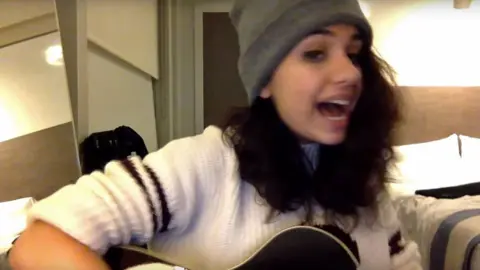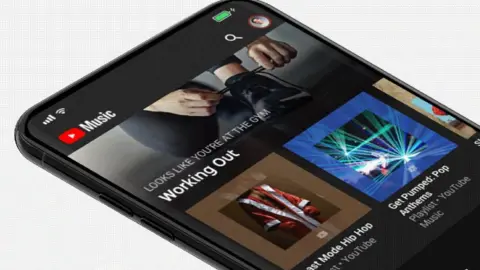Bedroom cover versions make it onto YouTube's music streaming app
 Alessia Cara / YouTube
Alessia Cara / YouTubeBig releases by Dua Lipa and Drake will mingle with amateur covers on YouTube's new music streaming app.
YouTube Music, which launches today in the UK, is seen as Google's response to services like Spotify and Apple Music.
It will replace the under-performing Google Play Music service, which is being phased out over time.
YouTube hopes to tempt fans away from its rivals by including videos, live performances and unsigned artists alongside current chart hits.
"If you're a bedroom musician and you've made a great cover, or you have an original composition, or you've made a mash-up, it's all in there," said T Jay Fowler, head of product at YouTube Music.
There's a thriving eco-system of cover versions on YouTube - with artists like Justin Bieber, Alessia Cara and Chloe x Halle scoring recording contracts after posting home-made recordings.
Whether people want to stream those alongside the originals is up for debate.
Allow Google YouTube content?
Like Spotify, YouTube Music is available as a free, ad-supported service. A £9.99 subscription, which strips out the ads and allows users to download tracks to their phones, is also available.
The new service marks a detente in YouTube's contentious relationship with the music industry.
The video-streaming platform currently accounts for 46% of all music listening across the world (excluding China) - but the site has been accused of paying much lower royalty rates than its competitors.
The International Federation of the Phonographic Industry says artists and labels receive $1 per year for every active YouTube user; whereas the average Spotify subscriber generates $20 a year.
"That's a boring old stat," said Lyor Cohen, the former head of Warner Music, who has been in charge of Google's music division since 2016.
"It confuses the fact that subscription and advertising are two different businesses.
"Our subscription business is going to [pay] precisely what our competition pays."
Cohen claimed that record labels had stopped complaining about the so-called "value gap" between YouTube and its rivals.
"I think it's a boring rap. I don't hear it any more," he told the BBC.
"The words I hear from the industry are, 'How can I be helpful? Count us in. We're super-stoked that you're creating a subscriptions business'".
"We want more artists to be able to make livings from being artists and songwriters, as well. I think that will be really healthy for our industry."
 YouTube
YouTubeMr Fowler added that YouTube Music would be specifically tailored to users' YouTube accounts, using their browsing history, the time of day and even their location to recommend appropriate music.
Like Spotify and Apple - but not Amazon Music - parents can choose to hear censored versions of explicit songs; and the app will "segregate" kids' music so it doesn't crop up in their parents' playlists.
"We know that parents listen to music with their children," said Mr Fowler. "So it'll still be presented to you, but it won't be co-mingled.
"Because you probably don't want family music on your personal mixtape alongside Childish Gambino."
YouTube Music will also allow fans to listen to performances from Radio 1's Live Lounge or Jools Holland's TV show as soon as they're posted to YouTube's main site.
Hard-to-find remixes and out-of-print rarities that users have uploaded to YouTube will also be included - apparently with the blessing of record labels and rights-holders.
The new service faces stiff competition, however, with both Apple Music and Spotify having gained significant footholds in the last few years.
In May, Spotify said it had reached 75 million subscribers globally, while Apple said in April its service had reached 48 million subscribers.

Follow us on Facebook, on Twitter @BBCNewsEnts, or on Instagram at bbcnewsents. If you have a story suggestion email [email protected].

